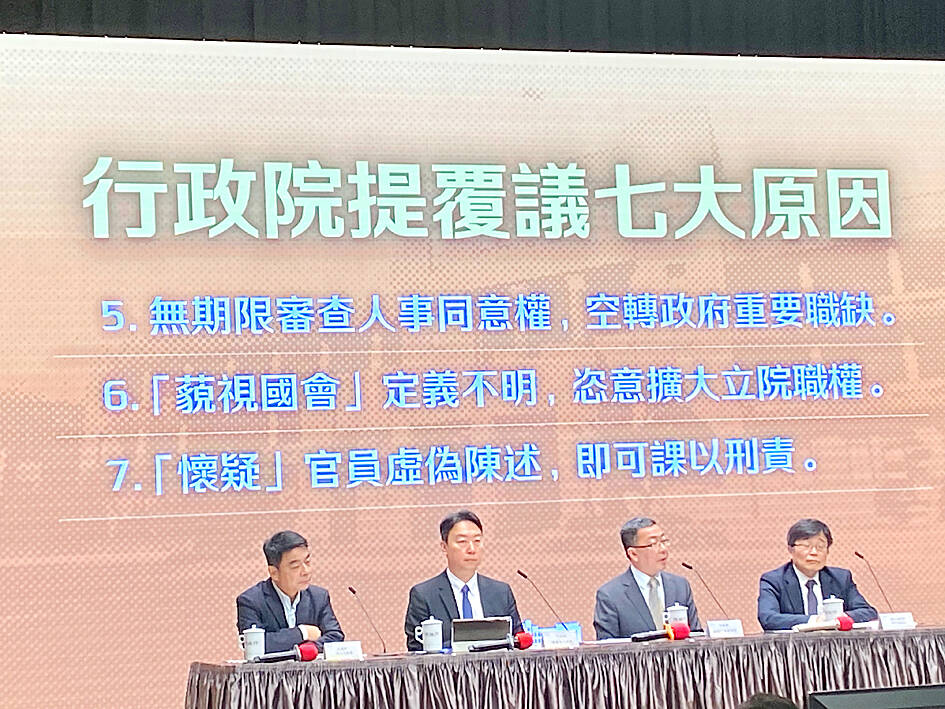The Executive Yuan yesterday decided to send controversial legislative reform bills back to lawmakers for reconsideration, pending approval from the president, saying they are unconstitutional and would be difficult to implement.
The Cabinet found the measures passed on Tuesday last week by Chinese Nationalist Party (KMT) and Taiwan People’s Party (TPP) lawmakers “difficult to implement,” Minister Without Portfolio Lin Ming-hsin (林明昕) told a news conference yesterday.
The Cabinet was preparing, pending the president’s approval, to request that lawmakers reconsider those revisions in accordance with Article 3-2 of the Additional Articles of the Constitution, he said.

Photo: Chung Li-hua, Taipei Times
Lin was referring to the measures that would give the legislature new investigative powers, the ability to hold hearings, and impose fines on public officials who refuse to attend a hearing or provide information, or lie.
Those measures contradicted past constitutional interpretations, which say the exercise of investigative and hearing powers must be restrained, Lin said.
Furthermore, the measures stipulate that public officials who fail to comply would be guilty of “contempt of the legislature” and subject to imprisonment, but does not clearly define what constitutes contempt, Lin said, adding that the punishments contravened constitutional principles of proportionality.
Lin said the amendments requiring the president to give an annual state of the nation address to the legislature and then take questions from the floor are unconstitutional, and are not in line with Taiwan’s system.
The deliberation that led up to the passage of the measures “lacked substantive discussions” and therefore “violated democratic principles,” Lin said.
Lin said the amendments to the Act Governing the Legislative Yuan’s Power (立法院職權行使法) and the Criminal Code were also approved through “unconstitutional procedures,” so those revisions, regardless of their justifiability, were unconstitutional.
The amendments seeking greater oversight of the president’s and Cabinet’s powers have caused brawls in the legislature and sparked heated debate in society over the past few weeks.
Although the Democratic Progressive Party (DPP) has vehemently opposed the revisions, it advocated for increased oversight of the executive branch while in opposition. However, it has sidelined the issue since coming to power in 2016.
The KMT and TPP maintain that the revisions have followed due process and are a necessary reform, in light of previous allegations of corruption in the government’s major policies and investment projects.
The Constitution states that if the Executive Yuan finds a bill passed by the Legislative Yuan difficult to execute, it can, with the president’s approval, request for the legislature’s reconsideration within 10 days of receiving the bill.
President William Lai (賴清德) would make a decision after a careful assessment, Presidential Office spokesperson Kuo Ya-hui (郭雅慧) said.
Within 15 days of receiving the Cabinet’s request, the legislature must vote on whether to uphold the passage of the bill. If it fails to reach a resolution within this period, the bill would become invalid.
The Cabinet’s decision was not meant to escalate conflict between the parties, Cabinet spokesperson Chen Shi-kai (陳世凱) cited Premier Cho Jung-tai (卓榮泰) as saying.
They hope that the legislature would re-examine the amendments and ensure they are aligned with the Constitution and national interests, Cabinet spokesperson Chen said.
Asked whether the Cabinet would take the case to the Constitutional Court, Lin only said it was “too early” to consider such a “hypothetical” question.
DPP lawmakers can also request a ruling from the Constitutional Court on the revisions’ constitutionality.

The Ministry of Education (MOE) is to launch a new program to encourage international students to stay in Taiwan and explore job opportunities here after graduation, Deputy Minister of Education Yeh Ping-cheng (葉丙成) said on Friday. The government would provide full scholarships for international students to further their studies for two years in Taiwan, so those who want to pursue a master’s degree can consider applying for the program, he said. The fields included are science, technology, engineering, mathematics, semiconductors and finance, Yeh added. The program, called “Intense 2+2,” would also assist international students who completed the two years of further studies in

Former president Tsai Ing-wen (蔡英文) departed for Europe on Friday night, with planned stops in Lithuania and Denmark. Tsai arrived at Taiwan Taoyuan International Airport on Friday night, but did not speak to reporters before departing. Tsai wrote on social media later that the purpose of the trip was to reaffirm the commitment of Taiwanese to working with democratic allies to promote regional security and stability, upholding freedom and democracy, and defending their homeland. She also expressed hope that through joint efforts, Taiwan and Europe would continue to be partners building up economic resilience on the global stage. The former president was to first

Former president Tsai Ing-wen (蔡英文) on Monday called for greater cooperation between Taiwan, Lithuania and the EU to counter threats to information security, including attacks on undersea cables and other critical infrastructure. In a speech at Vilnius University in the Lithuanian capital, Tsai highlighted recent incidents in which vital undersea cables — essential for cross-border data transmission — were severed in the Taiwan Strait and the Baltic Sea over the past year. Taiwanese authorities suspect Chinese sabotage in the incidents near Taiwan’s waters, while EU leaders have said Russia is the likely culprit behind similar breaches in the Baltic. “Taiwan and our European

The Taipei District Court sentenced babysitters Liu Tsai-hsuan (劉彩萱) and Liu Jou-lin (劉若琳) to life and 18 years in prison respectively today for causing the death of a one-year-old boy in December 2023. The Taipei District Prosecutors’ Office said that Liu Tsai-hsuan was entrusted with the care of a one-year-old boy, nicknamed Kai Kai (剴剴), in August 2023 by the Child Welfare League Foundation. From Sept. 1 to Dec. 23 that year, she and her sister Liu Jou-lin allegedly committed acts of abuse against the boy, who was rushed to the hospital with severe injuries on Dec. 24, 2023, but did not